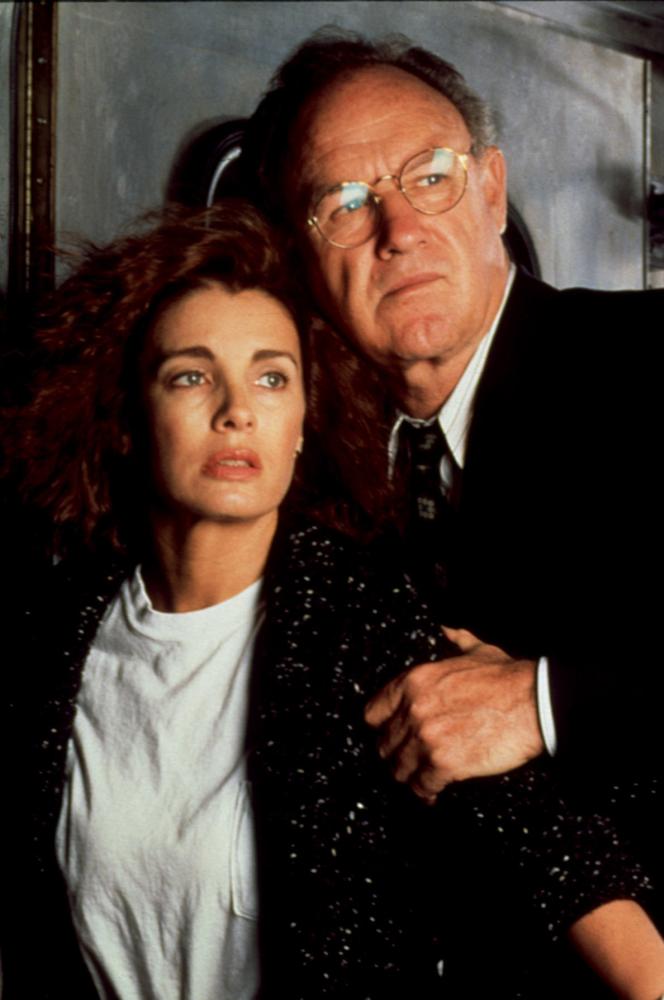Narrow Margin (1990)
DIRECTOR: Peter Hyams
CAST: Gene Hackman, Anne Archer, James B. Sikking, Nigel Bennett, Susan Hogan, J.T. Walsh, M. Emmet Walsh, Harris Yulin
REVIEW:
A loose remake of 1952’s The Narrow Margin, Narrow Margin is a nicely old-school, no-frills, lean and taut thriller that relies more on good old-fashioned cat-and-mouse suspense than flashy action sequences or special effects, with a brisk 99 minute runtime that gets in, gets the job done efficiently, and doesn’t overstay its welcome. It might not be the deepest or most substantial experience, but for those simply seeking a good old-fashioned suspense thriller, it’s a solidly diverting time.
The premise is simple and straightforward. Carol Hunnicut (Anne Archer) inadvertently witnesses the murder of lawyer Michael Tarlow (J.T. Walsh), on the orders of his boss, mob kingpin Leo Watts (Harris Yulin), and proceeds to get out of dodge. Dogged Los Angeles Assistant DA Robert Caulfield (Gene Hackman) tracks her down to her remote Canadian cabin, but unfortunately so do a couple of hitmen (James B. Sikking and Nigel Bennett). Caulfield and Hunnicut manage to make a narrow getaway onto a train bound for Vancouver, but the hitmen make it onboard as well. From there commences a cat-and-mouse game, as Caulfield struggles to keep Hunnicut one step ahead of her pursuers until they can get back to civilization.
Apart from the opening set-up and chase that lands our desperate duo on the train, the bulk of Narrow Margin takes place within the confines of the train winding its way through the Canadian wilderness. There’s a detour or two, including a brawl with a couple goons in a rest stop restroom, but the setting is mostly contained. Obviously this limits options for both hero and villains; the hitmen are cool-headed professionals looking to quietly dispatch Hunnicut with a precision strike without drawing attention to themselves. Stuck on a train with no easy escape route, they can’t afford to just rampage through the cars, guns blazing, which buys Caulfield and Hunnicut some time. On the other hand, Caulfield and Hunnicut have no way off either, so Caulfield’s options are limited to playing a shell game with whatever vacant compartments he can find, shuffling Hunnicut around and trying to stay one step ahead. There’s a few complications that crop up, including a few red herrings, other people in Caulfield’s office back in LA and other passengers on the train who may or may not be involved, and a rendezvous with some backup that might not be what it presents itself as. There’s a few bursts of action—the early chase between a car and a helicopter, and a couple brawls with hitmen—and a couple bits of misdirection about who the secret bonus pick bad guy(s) might be (though one “surprise reveal” is unsurprising), but overall the emphasis is heavier on suspense than action. There’s the occasional contrivance—Caulfield and Hunnicut drive a car through the forest to avoid a pursuing helicopter, and conveniently have enough room between the trees all the way to the train station—and one “surprise villain” is over-obvious, but nothing unforgivably glaring. Peter Hyams keeps things spare, tense, and taut, and nicely no-frills and to the point. Of course, the fittingly trim runtime helps.
The movie avoids one or two cliches, including by casting the heroic cop with middle-aged, Average Joe-ish Gene Hackman rather than a younger, “hotter” movie star. Hackman isn’t most people’s idea of an action hero, and the movie doesn’t try to turn him into one, at least not exaggeratedly so. The dynamic between Caulfield and Anne Archer’s Hunnicut is also refreshingly no-nonsense. There’s a little warming, but they don’t fall in love, nor is it ever suggested they’re remotely sexually or romantically interested in each other, despite that kind of dynamic often seeming all but inevitable between a man and woman in an action thriller. James B. Sikking and Nigel Bennett don’t have much required of them besides stalking up and down train cars (apart from one delicious verbal sparring match between Sikking and Hackman) but they serve their purpose as the requisite heavies effectively enough. There’s small opening roles for familiar character actors J.T. Walsh and M. Emmet Walsh (no relation), and Harris Yulin is suitably ominous in his opening scene as the otherwise offscreen “big bad”.
There’s something refreshingly simple, spare, and terse about Narrow Margin, demonstrating that an efficient suspense thriller can still get by on just good old-school elements without a bunch of flashy stunts, over-the-top action sequences, or special effects. It might not linger strongly in the memory, but for a brisk ninety-nine minutes, it’s a solid diversion.
* * *
